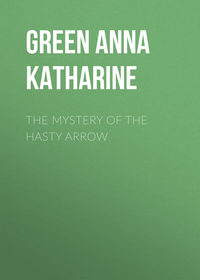
Cynthia Wakeham's Money
"'And you have property to leave?'
"'This house', answered the man.
"My eyes wandered mechanically to the empty cupboards about me from which the doors had been wrenched and, as I now saw from the looks of the fireplace, burned.
"'The ground – the ground is worth something,' quoth the man.
"'The avidity with which he spoke satisfied me at least upon one point —he was the expectant heir.
"'Your name?' I asked, turning sharply upon him.
"'Hiram Huckins.'
"It was the name attached to the telegram.
"'And you are the brother of this woman?'
"'Yes, yes.'
"I had addressed him, but I looked at her. She answered my look with a steadfast gaze, but there was no dissent in it, and I considered that point settled.
"'She is a married woman, then?'
"'A widow; husband died long years ago.'
"'Any children?'
"'No.' And I saw in her face that he spoke the truth.
"'But you and she have brothers or sisters? You are not her only relative?'
"'I am the only one who has stuck by her,' he sullenly answered. 'We did have a sister, but she is gone; fled from home years ago; lost in the great world; dead, perhaps. She don't care for her; ask her.'
"I did ask her, but the haggard face said nothing. The eyes burned, but they had a waiting look.
"'To whom do you want to leave your property?' I inquired of her pointedly.
"Had she glanced at the man, had her face even changed, or so much as a tremor shook her rigid form, I might have hesitated. But the quiet way in which she lifted her hand and pointed with one finger in his direction while she looked straight at me, convinced me that whatever was wrong, her mind was made up as to the disposal of her property. So taking out my papers, I sat down on the rude bench drawn up beside the bed and began to write.
"The man stood behind me with the lamp. He was so eager and bent over me so closely that the smell of the lamp and his nearness were more than I could bear.
"'Set down the lamp,' I cried. 'Get a table – something – don't lean over me like that.'
"But there was nothing, actually nothing for him to put the lamp on, and I was forced to subdue my disgust and get used as best I could to his presence and to his great shadow looming on the wall behind us. But I could not get used to her eyes hurrying me, and my hand trembled as I wrote.
"'Have you any name but Cynthia?' I inquired, looking up.
"She painfully shook her head.
"'You had better tell me what her husband's name was,' I suggested to the brother.
"'John Lapham Wakeham,' was the quick reply.
"I wrote down both names. Then I said, looking intently at the dying widow:
"'As you cannot speak, you must make signs. Shake your hand when you wish to say no, and move it up and down when you wish to say yes. Do you understand?'
"She signalled somewhat impatiently that she did, and then, lifting her hand with a tremulous movement, pointed anxiously towards a large Dutch clock, which was the sole object of adornment in the room.
"'She urges you to hurry,' whispered the man. 'Make it short, make it short. The doctor I called in this morning said she might die any minute.'
"As from her appearance I judged this to be only too possible, I hastily wrote a few words more, and then asked:
"'Is this property all that you have to leave?'
"I had looked at her, though I knew it would be the man who would answer.
"'Yes, yes, this house,' he cried. 'Put it strong; this house and all there is in it.'
"I thought of its barren rooms and empty cupboards, and a strange fancy seized me. Going straight to the woman, I leaned over her and said:
"'Is it your desire to leave all that you possess to this brother? Real property and personal, this house, and also everything it contains?'
"She did not answer, even by a sign, but pointed again to the clock.
"'She means that you are to go right on,' he cried. 'And indeed you must,' he pursued, eagerly. 'She won't be able to sign her name if you wait much longer.'
"I felt the truth of this, and yet I hesitated.
"'Where are the witnesses?' I asked. 'She must have two witnesses to her signature.'
"'Won't I do for one?' he inquired.
"'No,' I returned; 'the one benefited by a will is disqualified from witnessing it.'
"He looked confounded for a moment. Then he stepped to the door and shouted, 'Briggs! Briggs!'
"As if in answer there came a clatter as of falling dishes, and as proof of the slavery which this woman had evidently been under to his avarice, she gave a start, dying as she was, and turned upon him with a frightened gaze, as if she expected from him an ebullition of wrath.
"'Briggs, is there a light in Mr. Thompson's house?'
"'Yes,' answered a gruff voice from the foot of the stairs.
"'Go then, and ask him or the first person you see there, if he will come in here for a minute. Be very polite and don't swear, or I won't pay you the money I promised you. Say that Mrs. Wakeham is dying, and that the lawyer is drawing up her will. Get James Sotherby to come too, and if he won't do it, somebody else who is respectable. Everything must be very legal, sir,' he explained, turning to me, 'very legal.'
"Not knowing what to think of this man, but seeing only one thing to do, I nodded, and asked the woman whom I should name as executor. She at once indicated her brother, and as I wrote in his name and concluded the will, she watched me with an intentness that made my nerves creep, though I am usually anything but susceptible to such influences. When the document was ready I rose and stood at her side in some doubt of the whole transaction. Was it her will I had expressed in the paper I held before me, or his? Had she been constrained by his influence to do what she was doing, or was her mind free to act and but obeying its natural instincts? I determined to make one effort at finding out. Turning towards the man, I said firmly:
"'Before Mrs. Wakeham signs this will she must know exactly what it contains. I can read it to her, but I prefer her to read the paper for herself. Get her glasses, then, if she needs them, and bring them here at once, or I throw up this business and take the document away with me out of the house.'
"'But she has no glasses,' he protested; 'they were broken long ago.'
"'Get them,' I cried; 'or get yours, – she shall not sign that document till you do.'
"But he stood hesitating, loth, as I now believe, to leave us together, though that was exactly what I desired, which she, seeing, feverishly clutched my sleeve, and, with a force of which I should not have thought her capable, made wild gestures to the effect that I should not delay any longer, but read it to her myself.
"Seeing by this, as I thought, that her own feelings were, notwithstanding my doubts, really engaged in the same direction as his, I desisted from my efforts to separate the two, if it were only for a moment, and read the will aloud. It ran thus:
"The last will and testament of Cynthia Wakeham, widow of John Lapham Wakeham, of Flatbush, Kings County, New York.
"First: I direct all my just debts and funeral expenses to be paid.
"Second: I give, devise, and bequeath to my brother, Hiram Huckins, all the property, real and personal, which I own, or to which I may be entitled, at the time of my death, and I appoint him the sole executor of this my last will and testament.
"Witness my hand this fifth day of June, in the year eighteen hundred and eighty-eight.
"Signed, published, and declared by the Testatrix to be her last will and testament, in our presence who, at her request and in her presence and in the presence of each other, have subscribed our names hereto as witnesses, on this 5th day of June, 1888.
"'Is that the expression of your wishes?' I asked, when I had finished.
"She nodded, and reached out her hand for the pen.
"'You must wait,' said I, 'for the witnesses.'
"But even as I spoke their approach was heard, and Huckins was forced to go to the door with the lamp, for the hall was pitch dark and the stairs dangerous. As he turned his back upon us, I thought Mrs. Wakeham moved and opened her lips, but I may have been mistaken, for his black and ominous shadow lay over her face, and I could discern but little of its expression.
"'Is there anything you want?' I asked her, rising and going to the bedside.
"But Huckins was alert to all my movements, if he had stepped for a moment away.
"'Give her water,' he cried, wheeling sharply about. And pointing to a broken glass standing on the floor at her side, he watched me while I handed it to her.
"'She mus'n't give out now,' he pursued, with one eye on us and the other on the persons coming upstairs.
"'She will not,' I returned, seeing her face brighten at the sound of approaching steps.
"'It's Miss Thompson and Mr. Dickey,' now spoke up the gruff voice of Briggs from the foot of the steps. 'No other folks was up, so I brought them along.'
"The young woman, who at this instant appeared in the doorway, blushed and cast a shy look over her shoulder at the fresh-faced man who followed her.
"'It's all right, Minnie,' immediately interposed that genial personage, with a cheerful smile; 'every one knows we are keeping company and mean to be married as soon as the times improve.'
"'Yes, every one knows,' she sighed, and stepped briskly into the room, her intelligent face and kindly expression diffusing a cheer about her such as the dismal spot had doubtless lacked for years.
"I heard afterward that this interesting couple had been waiting for the times to improve, for the last fifteen years."
III.
CONTINUATION OF A LAWYER'S ADVENTURE
"The two witnesses had scarcely entered the room before the dying woman stretched out her hand again for the pen. As I handed it to her and placed the document before her on my portfolio, I asked:
"'Do you declare this paper to be your last will and testament and do you request these persons to witness it?'
"She bowed a quick acquiescence, and put the pen at the place I pointed out to her.
"'Shall I support your hand?' I pursued, fearful she would not have the strength to complete the task.
"But she shook her head and wrote her name in hastily, with a feverish energy that astonished me. Expecting to see her drop back exhausted if not lifeless as the pen left the paper, I drew the document away and bent to support her. But she did not need my assistance. Indeed she looked stronger than before, and what was still more astonishing, seemed even more anxious and burningly eager.
"'Is she holding up till the witnesses have affixed their signatures?' I inwardly queried. And intent upon relieving her, I hastily explained to them the requirements of the case, and did not myself breathe easily till I saw their two names below hers. Then I felt that she could rest; but to my surprise but one sigh of relief rose in that room, and that was from the cringing, cruel-eyed inheritor, who, at the first intimation that the document was duly signed and attested, sprang from his corner with such a smile that the place seemed to grow hideous, and I drew involuntarily back.
"'Let me have it,' were his first words. 'I have lived in this hole, and for fifteen years made myself a slave to her whims, till I have almost rotted away like the place itself. And now I want my reward. Let me have the will.'
"His hand was on the paper and in my surprise I had almost yielded it up to him, when another hand seized it, and the dying, gasping woman, mumbling and mouthing, pointed for the third time to the clock and then to one corner of the paper, trying to make me understand something I entirely failed to comprehend.
"'What is it?' I asked. 'What do you want? Is not the will to your liking?'
"'Yes, yes,' her frenzied nods seemed to say, and yet she continued pointing to the clock and then to the paper while the angry man before her stared and muttered in a mixture of perplexity and alarm which added no little to the excitement of the harrowing scene.
"'Let me see if I can tell what she wants,' suddenly observed the young woman who had signed the paper as a witness. And bringing her sweet womanly face around where the rolling eye of the woman could see her, she asked with friendly interest in her tone, 'Do you wish the time of day written on the will?'
"Oh, the relief that swept over that poor woman's tortured countenance! She nodded and looked up at me so confidingly that in despite of the oddity of the request I rapidly penned after the date, the words 'at half-past ten o'clock P.M.,' and caused the witnesses to note the addition.
"This seemed to satisfy her, and she sank back with a sign that I was to yield to her brother's demand and give him the paper he coveted, and when I hesitated, started up again with such a frenzied appeal in her face that in the terror of seeing her die before our eyes, I yielded it to his outstretched hand, expecting at the most to see him put it in his pocket.
"But no, the moment he felt it in his grasp, he set down the lamp, and, without a look in her direction or a word of thanks to me or the two neighbors who had come to his assistance, started rapidly from the room. Disturbed and doubting my own wisdom in thus yielding to an impulse of humanity which may be called weakness by such strong-minded men as yourself, I turned to follow him, but the woman's trembling hand again stopped me; and convinced at last that I was alarming myself unnecessarily and that she had had as much pleasure in making him her heir as he in being made so, I turned to pay her my adieux, when the expression of her face, changed now from what it had been to one of hope and trembling delight, made me pause again in wonder, and almost prepared me for the low and thrilling whisper which now broke from her lips in distinct tones.
"'Is he gone?'
"'Then you can speak,' burst from the young woman.
"The widow gave her an eloquent look.
"'I have not spoken,' said she, 'for two days; I have been saving my strength. Hark!' she suddenly whispered. 'He has no light, he will pitch over the landing. No, no, he has gone by it in safety, he has reached – ' she paused and listened intently, trembling as she did so – 'Will he go into that room? – Run! follow! see if he has dared – but no, he has gone down to the kitchen,' came in quick glad relief from her lips as a distant door shut softly at the back end of the house. 'He is leaving the house and will never come back. I am released forever from his watchfulness; I am free! Now, sir, draw up another will, quick; let these two kind friends wait and see me sign it, and God will bless you for your kindness and my eyes will close in peace upon this cruel world.'
"Aghast but realizing in a moment that she had but lent herself to her brother's wishes in order to rid herself of a surveillance which had possibly had an almost mesmeric influence upon her, I opened my portfolio again, saying:
"'You declare yourself then to have been unduly influenced by your brother in making the will you have just signed in the presence of these two witnesses?'
"To which she replied with every evidence of a clear mind —
"'I do; I do. I could not move, I could not breathe, I could not think except as he willed it. When he was near, and he was always near, I had to do just as he wished – perhaps because I was afraid of him, perhaps because he had the stronger will of the two, I do not know; I cannot explain it, but he ruled me and has done so all my life till this hour. Now he has left me, left me to die, as he thinks, unfriended and alone, but I am strong yet, stronger than he knows, and before I turn my face to the wall, I will tear my property from his unholy grasp and give it where I have always wanted it to go – to my poor, lost, unfortunate sister.'
"'Ah,' thought I, 'I see, I see'; and satisfied at last that I was no longer being made the minister of an unscrupulous avarice, I hastily drew up a second will, only pausing to ask the name of her sister and the place of her residence.
"'Her name is Harriet Smith,' was the quick reply, 'and she lived when last I heard of her in Marston, a little village in Connecticut. She may be dead now, it is so long since I received any news of her, – Hiram would never let me write to her, – but she may have had children, and if so, they are just as welcome as she is to the little I have to give.'
"'Her children's names?' I asked.
"'I don't know, I don't know anything about her. But you will find out everything necessary when I am gone; and if she is living, or has children, you will see that they are reinstated in the home of their ancestors. For,' she now added eagerly, 'they must come here to live, and build up this old house again and make it respectable once more or they cannot have my money. I want you to put that in my will; for when I have seen these old walls toppling, the doors wrenched off, and its lintels demolished for firewood, for firewood, sir, I have kept my patience alive and my hope up by saying, Never mind; some day Harriet's children will make this all right again. The old house which their kind grandfather was good enough to give me for my own, shall not fall to the ground without one effort on my part to save it. And this is how I will accomplish it. This house is for Harriet or Harriet's children if they will come here and live in it one year, but if they will not do this, let it go to my brother, for I shall have no more interest in it. You heed me, lawyer?'
"I nodded and wrote on busily, thinking, perhaps, that if Harriet or Harriet's children did not have some money of their own to fix up this old place, they would scarcely care to accept their forlorn inheritance. Meantime the two witnesses who had lingered at the woman's whispered entreaty exchanged glances, and now and then a word expressive of the interest they were taking in this unusual affair.
"'Who is to be the executor of this will?' I inquired.
"'You,' she cried. Then, as I started in surprise, she added: 'I know nobody but you. Put yourself in as executor, and oh, sir, when it is all in your hands, find my lost relatives, I beseech you, and bring them here, and take them into my mother's room at the end of the hall, and tell them it is all theirs, and that they must make it their room and fix it up and lay a new floor – you remember, a new floor – and – ' Her words rambled off incoherently, but her eyes remained fixed and eager.
"I wrote in my name as executor.
"When the document was finished, I placed it before her and asked the young lady who had been acting as my lamp-bearer to read it aloud. This she did; the second will reading thus:
"The last will and testament of Cynthia Wakeham, widow of John Lapham Wakeham, of Flatbush, Kings County, New York.
"First: I direct all my just debts and funeral expenses to be paid.
"Second: I give, devise, and bequeath all my property to my sister, Harriet Smith, if living at my death, and, if not living, then to her children living at my death, in equal shares, upon condition, nevertheless, that the legatee or legatees who take under this will shall forthwith take up their residence in the house I now occupy in Flatbush, and continue to reside therein for at least one year thence next ensuing. If neither my said sister nor any of her descendants be living at my death, or if so living, the legatee who takes hereunder shall fail to comply with the above conditions, then all of said property shall go to my brother, Hiram Huckins.
"Third: I appoint Frank Etheridge, of New York City, sole executor of this my last will and testament, thereby revoking all other wills by me made, especially that which was executed on this date at half-past ten o'clock.
"Witness my hand this fifth day of June, in the year eighteen hundred and eighty-eight.
"Signed, published, and declared by the testatrix to be her last will and testament, in our presence, who, at her request and in her presence and in the presence of each other, have subscribed our names hereto as witnesses, on this 5th day of June, 1888, at five minutes to eleven P.M.
"This was satisfactory to the dying widow, and her strength kept up till she signed it and saw it duly attested; but when that was done, and the document safely stowed away in my pocket, she suddenly collapsed and sank back in a dying state upon her pillow.
"'What are we going to do?' now cried Miss Thompson, with looks of great compassion at the poor woman thus bereft, at the hour of death, of the natural care of relatives and friends. 'We cannot leave her here alone. Has she no doctor – no nurse?'
"'Doctors cost money,' murmured the almost speechless sufferer. And whether the smile which tortured her poor lips as she said these words was one of bitterness at the neglect she had suffered, or of satisfaction at the thought she had succeeded in saving this expense, I have never been able to decide.
"As I stooped to raise her now fallen head a quick, loud sound came to our ears from the back of the house, as of boards being ripped up from the floor by a reckless and determined hand. Instantly the woman's face assumed a ghastly look, and, tossing up her arms, she cried:
"'He has found the box! – the box! Stop him! Do not let him carry it away! It is – ' She fell back, and I thought all was over; but in another instant she had raised herself almost to a sitting position, and was pointing straight at the clock. 'There! there! look! the clock!' And without a sigh or another movement she sank back on the pillow, dead."
IV.
FLINT AND STEEL
"Greatly startled, I drew back from the bed which but a moment before had been the scene of such mingled emotions.
"'All is over here,' said I, and turned to follow the man whom with her latest breath she had bidden me to stop from leaving the house.
"As I could not take the lamp and leave my companions in darkness, I stepped out into a dark hall; but before I had taken a half dozen steps I heard a cautious foot descending the back stairs, and realizing that it would be both foolish and unsafe for me to endeavor to follow him through the unlighted rooms and possibly intricate passages of this upper hall, I bounded down the front stairs, and feeling my way from door to door, at last emerged into a room where there was a lamp burning.
"I had found the kitchen, and in it were Huckins and the man Briggs. Huckins had his hand on the latch of the outside door, and from his look and the bundle he carried, I judged that if I had been a minute later he would have been in full flight from the house.
"'Put out the light!' he shouted to Briggs.
"But I stepped forward, and the man did not dare obey him, and Huckins himself looked cowed and dropped his hand from the door-knob.
"'Where are you going?' I asked, moving rapidly to his side.
"'Isn't she dead?' was his only answer, given with a mixture of mockery and triumph difficult to describe.
"'Yes,' I assented, 'she is dead; but that does not justify you in flying the house.'
"'And who says I am flying?' he protested. 'Cannot I go out on an errand without being told I am running away?'
"'An errand,' I repeated, 'two minutes after your sister has breathed her last! Don't talk to me of errands. Your appearance is that of flight, and that bundle in your arms looks like the cause of it.'
"His eye, burning with a passion very natural under the circumstances, flashed over me with a look of disdain.
"'And what do you know of my appearance, and what is it to you if I carry or do not carry a bundle out of this house? Am I not master of everything here?'
"'No,' I cried boldly; then, thinking it might perhaps be wiser not to undeceive him as to his position till I had fully sounded his purposes, I added somewhat nonchalantly: 'that is, you are not master enough to take anything away that belonged to your sister. If you can prove to me that there is nothing in that bundle save what is yours and was yours before your sister died, well and good, you may go away with it and leave your poor dead sister to be cared for in her own house by strangers. But while I have the least suspicion that property of any nature belonging to this estate is hidden away under that roll of old clothes, you stop here if I have to appeal first to the strength of my arms and then to that of the law.'










